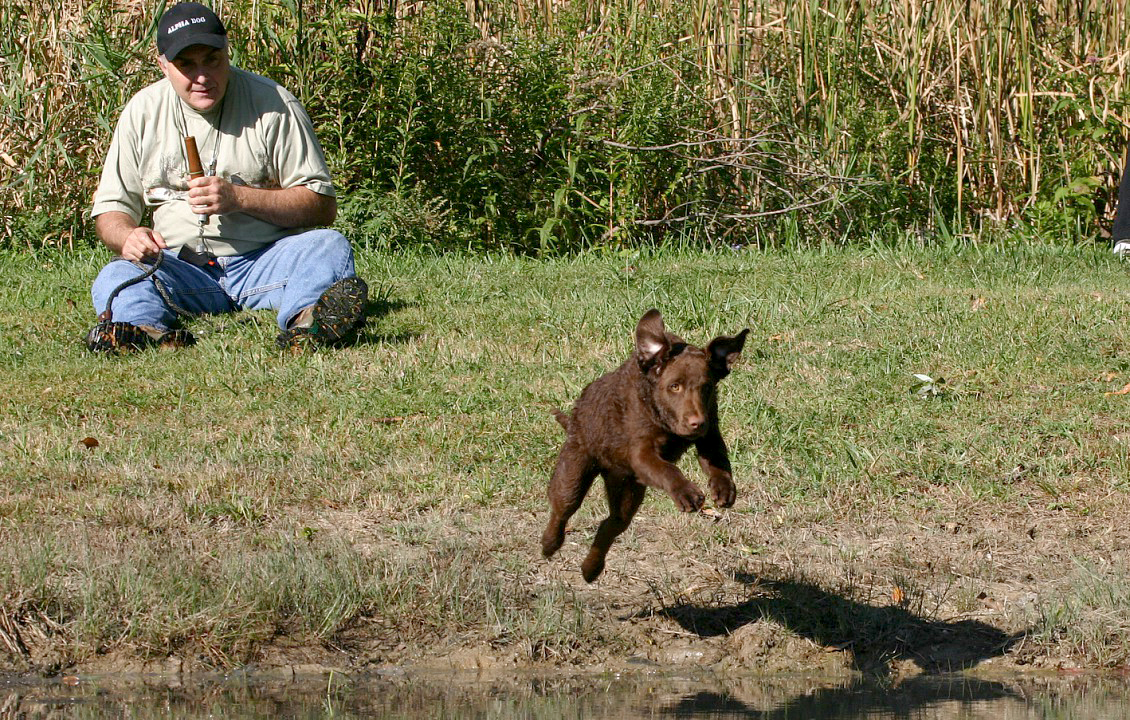Chesapeake Bay Retrievers

My son and I hunted ducks during the first week in January on the Finger Lakes and the temperatures were the coldest I’ve hunted in my over five decades of chasing waterfowl. We didn’t dare bring Joel’s black Labrador Retriever Genny as much as we would have loved to have her there to retrieve our downed birds. The subzero temperatures and ice on the shore would have been too dangerous for the young dog. There is only one breed of retriever that can handle that kind of severe hunting conditions, and that is the Chesapeake Bay retriever.
This breed of dogs is the linebacker of retrieving breeds, actually bred to handle harsh circumstances. I contacted Tom Frew, a chessie breeder and owner of Spendthrift Kennels in LeRoy for some details on these rugged dogs. Tom is a wealth of information on the breed and was gracious enough to pass this on.
“Chesapeake Bay Retrievers (aka “Chessie) originated in this country, coming from stock destined to sail from England. In the year 1807, an English brig wrecked off the coast of Maryland; the crew and cargo were rescued by the ship Canton. Also rescued were two Newfoundland puppies, a dingy red dog named “Sailor,” and a black bitch named “Canton.” The two dogs, who turned out to be wonderful retrievers, were presented to the gentlemen who helped the shipwrecked. Many of the nondescript dogs used for retrieving in the area were bred to them, in addition to other outcrosses, such as the English Otter Hound, Flat-Coat, and Curly-Coated Retriever.
“In 1918, a Breed Standard was written and approved by over 50 breeders in the US and Canada. As early as the 1930’s, there are documented titles won by Chessies starting primarily in Hunt and Field Trial competitions as well as Bench or Show Champions. Today, the Chesapeake Bay Retriever can be found scoring well in virtually every imaginable type of dog competition.
“I have owned several hunting breeds including the German Shorthaired Pointer, Labrador Retriever, and English Pointer. I have found the Chesapeake Bay Retriever to be the easiest to train. Some will say Chessies are hard headed, but this has not been my experience. They need variety in their training regimen. Repeat training sessions bore the Chesapeake Bay Retriever. They deal better with concepts and a variety of opportunities to solve a similar retrieving problem. They want to please their master and are best trained (like most hunting breeds) when there is one master delivering the training. When handled properly they are quick to learn, accomplish, and succeed. They only ask for companionship and respect from the handler. A pat on the head or an occasional “cookie” goes a long way with the Chessie.
“I have owned four and trained a fifth CBR. I cannot tell you which was the best as they all have been exceptional dogs and each has a place in my heart! Four of the five were relatives and all five have been bitches because I have desired to continue a line of dogs now approaching 45 years. I am first a waterfowl hunter who desires a well-behaved house pet. All my dogs have been family members and resided in the house.
“The Chesapeake distances itself from the other retriever breeds, in my opinion, in a couple of obvious ways. First, the breed is extremely cold weather hearty. Cold weather doesn’t faze the Chesapeake. Just recently, I had my Gabby in subfreezing air temps on Oatka Creek where she had to make several retrieves in very cold water. After each retrieve, she shook off and released the bird to me looking as if to say, “Where’s the next one, Dad?” Never once did she shiver, whine or give any indication other than, “Let’s do some more of this!”
“They are all business and their fetch object is paramount in the mind of this breed. Whether it’s a retriever bumper in a training session, a crippled bird dropped on a farm pond or a “Kong” chew toy tossed across the kitchen floor, that item is the most important object at that second of that dog’s life. And they will do whatever is necessary to get to the object and bring it to their master.
“One of my early Chessies named Jessie was with me in Upper NY State. We were hunting in flooded timber and I had dropped a wood duck in some thick cover falling crippled about sixty yards from us. I sent Jessie straight out to the area of the fall and gave her a single whistle blast which means stop and look back at me. She did and I cast her to the left. Jessie, as instructed, swam left and fell out of sight. I heard her yelp once which was not normal. She was gone what seemed like an eternity, but about five minutes later she appeared with that duck in her mouth. After we were done hunting back at the lodge, Jessie came up lame. The next Monday, I took her to the vets and it was found she’d torn two ligaments in her knee and required some serious corrective surgery. Remember that yelp??? I believe she’d gotten her leg caught in undergrowth and in an effort to free herself, had torn her ACL and MCL ligaments! But that duck was coming back regardless! She was laid up for six months from surgery.
“So, Chesapeake Bay Retrievers are a tough breed and a great dog for those who have time, initiative and the desire to keep them busy and to give them the love they deserve. For more information on this exceptional gun dog breed, visit The American Chesapeake Club at http://www.amchessieclub.org/.”
Thanks to Mr. Frew … as you can tell the man loves his Chessies. If you are interested in one of these handsome dogs, Tom has a litter due in the spring that has fantastic pedigrees. I believe he has a few pups available to reserve. Go to spendthriftkennels.com for details.




